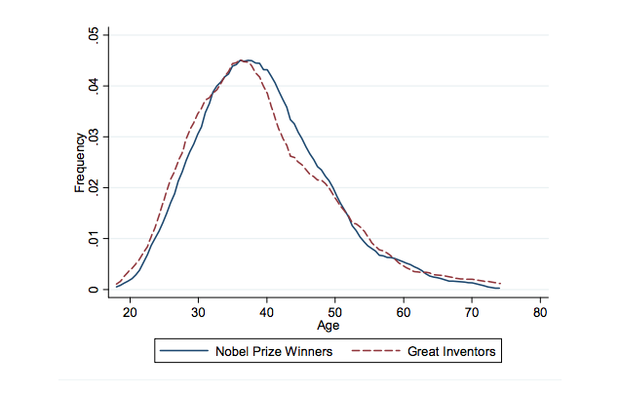You’re probably too old to become a Nobel Prize winner or great inventor, says paper

According to Age and Scientific Genius, a paper published by the National Bureau of Economic Research, you’re most likely to make a revolutionary discovery in your 20s and early 30s. But, on the upside, great scientific output doesn't typically peak until middle age.
The paper, written by Benajmin Jones and Bruce A. Weinberg, does what it says on the tin, looking at the relationship between scientific genius – as measured by awarded Nobel Prizes and inventions – and age.
The pair have gone through a pile of literature that has looked at comparisons between age and peak performance over the past century.
Here are five (out of many) things they found:
Young revolutionaries
The reason you’re most likely to make a revolutionary discoveries – as opposed to within-paradigm ones – in your 20s to 30s is that prefrontal cortex function declines with age, limiting creative thinking, according to a cited 2007 study from The Journal of Creative Behavior.
The age of scientific genius shifts
And, over the last century, the peak age has increased:

One hit wonders are usually conceptual
It turns out that people who make “dramatic contributions” at the beginning of their careers are usually making conceptual contributions. This is because they do their most important work shortly after being exposed to a paradigm.
Experimental innovators, on the other hand, usually work on topical questions to build up the necessary knowledge to do important work.
The 2007 study showed that experimental innovators tended to peak in their mid-50s, whereas conceptual innovators completed their best work aged 25.
Education and age make a difference
Another thing the study deals with is the relationship between mean age at PhD and Nobel Prize winning achievement:

You’re only as good as those around you
Finally, according to a 1977 study on American Nobel Prize winners Jones and Weinberg looked at, laureates who trained with other laureates received Nobel Prizes seven years earlier than others.
Prize-winning work was completed at the grand old age of 38 for those under another laureate.